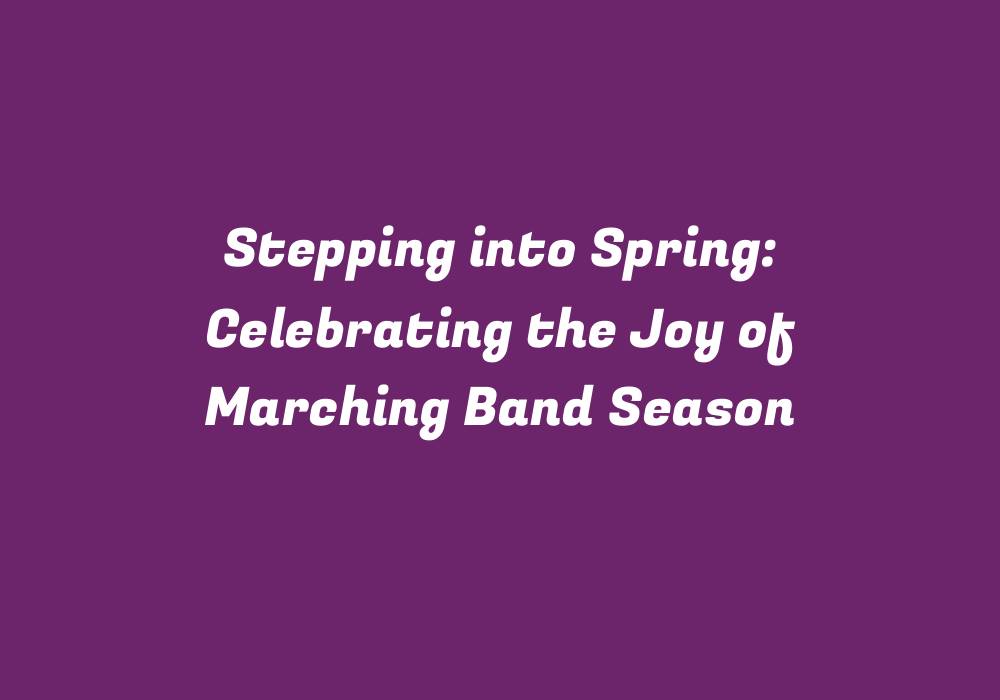Introduction to the Marching Band Season
As the winter winds finally subside, and we step into spring’s warmth, a new season awaits us – one that combines music, athleticism, and camaraderie: the marching band season. For many students across the United States, this period marks an opportunity to explore their creative talents while celebrating their love for music in a unique and spirited way.
History of Marching Bands
Marching bands have been part of American culture since the late 19th century, starting with military marching bands and later evolving into collegiate and high school traditions. The first college marching band was formed at Indiana University in 1897, followed by others across the nation as universities sought to enhance their athletic programs’ fanfare. By the 1920s, high schools began adopting similar concepts for their own extracurricular activities.
Today, marching bands continue to captivate audiences during football games and parades, adding a visual and auditory dimension that makes them an essential part of American culture. From the drum line’s thunderous beats and the trumpet section’s soaring melodies to the colorful pageantry of their uniforms and routines, marching bands offer an unforgettable experience for both performers and spectators alike.
Marching Band Season: A Unique Journey
The marching band season typically begins in spring and extends through the end of fall. During this time, members not only hone their skills as musicians but also participate in rigorous rehearsals to perfect their showmanship and visual presentation.
As part of this process, bands often work on developing new routines, music selections, and choreography that represent a specific theme or storyline. These components combine with the musicians’ performance to create an unforgettable experience for both performers and spectators alike.
Benefits of Participating in Marching Bands
Participation in marching bands can bring numerous benefits to students. Firstly, it fosters a strong sense of camaraderie among band members, creating bonds that last long after graduation. The shared experience of rehearsals and performances creates lasting memories and friendships, further strengthening the bond between individuals who may otherwise have never met.
Additionally, marching bands provide an opportunity for students to develop a wide range of skills that can serve them well in various aspects of their lives. From teamwork and communication to discipline and time management, the experience helps students grow both personally and professionally.
Marching Band Season: Beyond Entertainment
While entertainment is undoubtedly one of the primary purposes of marching bands, they also serve as a powerful educational tool. By participating in music ensembles, students develop strong musical foundations that can lead them to pursue careers in various fields such as performance, teaching, or even composing.
Moreover, marching band season provides an excellent platform for exploring cultural heritage and traditions through the lens of music and visual presentation. For many schools, their marching bands represent a source of pride and unity within their communities and serve as a reminder of the importance of preserving local history.
Conclusion: Embracing the Spirit of Spring with Marching Bands
As we welcome the warm embrace of spring and prepare for the exciting events that mark this new season, let us not forget to celebrate the joy of marching bands – a testament to the power of music, camaraderie, and tradition. From their humble beginnings as military bands to the vibrant, multifaceted entities they are today, these ensembles continue to inspire and entertain generations of students while fostering personal growth and lasting memories.
So as we embark on this spring season and step into a new chapter, let us embrace the spirit of marching bands – an unparalleled experience that brings together music, athleticism, and the undeniable joy of community.
